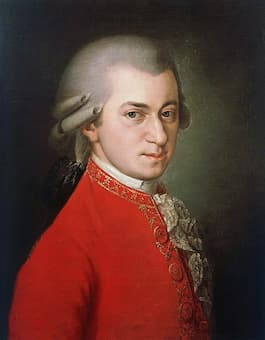
Wolfgang Amadeus Mozart
In the historiography of Western music Wolfgang Amadeus Mozart occupies a special position. We consider him an exceptional and singular musical genius who attained the status of an undisputed superstar of Classical music. God-like status and reverence aside, we also understand, however, that Mozart was very human in his emotions and frequently plagued by self-doubt, insecurities and petty professional jealousies. His performing career took him across Europe and brought him in contact with the leading composers of his days. It exposed him to a multiplicity of compositional styles, tastes and genres.
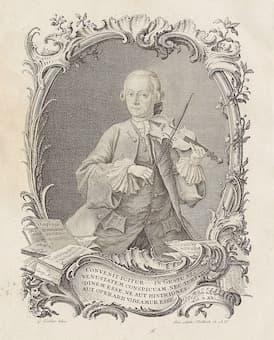
Leopold Mozart, 1756
Mozart unrelentingly integrated, synthesized and transformed these stylistic and musical conventions to produce compositions of universal appeal and stunning individuality. Mozart once remarked that people commonly make the mistake of assuming that his compositional prowess and art were the result of his inexplicable innate ability. They are all wrong, he wrote, “Nobody has devoted so much time and thought to composition as I.” Although Mozart’s compositions stand at the pinnacle of a late eighteenth century musical style, he was not the only attraction in town. Rather, he stood at the fore of a whole host of talented and creative composers that not only filled his ears with their music but also competed for his audience. Why don’t we take a brief look at selected musical and personal relationships between Mozart and his fellow colleagues that he encountered during his life’s journey? And his father Leopold seems like good starting point.
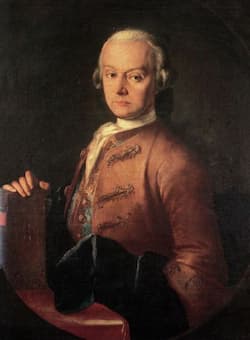
Leopold Mozart by Pietro Antonio Lorenzoni
Johann Georg Leopold Mozart (1719-1787) was a controversial figure among his biographers. He was either seen as “a man of broad cultural achievement who was difficult to please and at times intractable who deeply cared for his son but was frustrated in his ambition to secure for Wolfgang a worldly position appropriate to his genius.” Alternately he is described as “excessively manipulative, intolerant, and autocratic, resulting in considerable hardship for his children.” While these subtle differences will undoubtedly be debated for some time to come, we know that Leopold was born in Augsburg and sang as a choirboy at an early age. Once he had made his way to Salzburg, he abruptly ended his schooling and decided to become a professional musician. By all accounts, Leopold was a prolific composer who wrote in almost all musical genres of his time. However, posterity primarily remembers him as the author of a highly influential violin method, and as the pedagogue who fostered, developed and displayed the musical talents of his children. While we should certainly give Leopold Mozart credit for sacrificing his performing activities in order to further the career of his son, he was not a particularly successful salesperson. Wolfgang never held a significant musical appointment, and to the great consternation of his father, build his reputation as a freelance performer, teacher, composer and publisher of his own music. Leopold, it seems, was not easily impressed but Wolfgang never stopped trying.
Leopold Mozart: Symphony in G Major, “Neue Lambacher” (Toronto Chamber Orchestra; Kevin Mallon, cond.)
Wolfgang Amadeus Mozart: Violin Concerto No. 5, K. 219
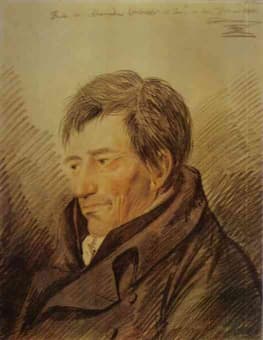
Muzio Clementi, 1810
Muzio Clementi was a celebrated and established composer, pedagogue, conductor, music publisher, editor, piano manufacturer and keyboard virtuoso. Based in London, Clementi embarked on a three-year European tour in 1780 that saw him initially perform in Paris for Marie Antoinette. Subsequent stops included Munich and Salzburg before he made his way to Vienna, arriving on 19 December 1781. Mozart had just arrived in Vienna as well, and on Christmas Eve the Empress Maria Theresa and her husband Francis I—parents of Marie Antoinette—hosted a reception. The scheduled main event that evening was a grand musical duel between Mozart and Clementi, but somebody forget to tell the musicians. With guests placing bets on the outcome, the competition did take place and was diplomatically declared a tie. Mozart and Clementi enjoyed a thoroughly cordial relationship, and Clementi wrote, “until then I had never heard anyone play with such spirit and grace.” Mozart on the other hand, was clearly surprised by Clementi’s technical facility as he wrote to his father, “Clementi plays well, as far as execution with the right hand goes. His greatest strength lies in his passages in thirds. Apart from that, he doesn’t have a Kreuzer’s worth of taste or feeling. In short, he is a mere robot.” Clementi’s performance clearly struck a nerve, as Mozart had thought himself unassailable on the keyboard. Mozart also remembered the opening theme of the Clementi sonata performed that evening and he “borrowed” it ten years later for his overture to the Magic Flute. Clementi left Vienna in May 1782, and as far as we know, they never met again.
Muzio Clementi: Piano Sonata Op. 24, No. 2 (Sang Mi Chung, piano)
Wolfgang Amadeus Mozart: The Magic Flute, K. 620 “Overture” (London Philharmonic Orchestra; Alfred Scholz, cond.)
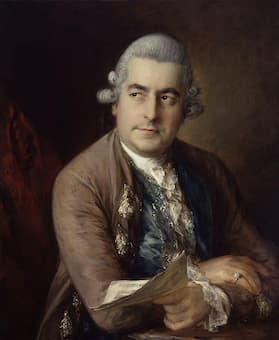
Johann Christian Bach by Thomas Gainsborough, 1776
Young Mozart would certainly have qualified for some serious frequent flier miles. Leopold immediately knew that his son represented a unique talent and opportunity, and they busily visited the courts and musical centers of Western Europe. Already in 1764 we find them first in Paris and subsequently in London. The British capital was under the spell of Johann Christian Bach, the youngest son of Johann Sebastian. Wolfgang received musical instructions from Bach, and Nannerl Mozart reports. “Herr Johann Christian Bach, the Queen’s teacher, took Wolfie between his legs, the former played a few bars, and the other continued, and in this way they played a whole sonata, and someone not seeing it would have thought that only one man was playing.” After a mere four weeks under Bach’s mentorship Wolfie showed remarkable progress and growth as a composer. Leopold wrote, ”what he had known when he left Salzburg is nothing compared with what he knows now; it defies the imagination … right now, Wolfgang is sitting at the harpsichord playing Bach’s trios.” When Mozart said farewell to his friend Johann Christian and England, he carried with him a substantial parcel containing music by the “London Bach.” In 1772, at Leopold’s urging, Mozart transcribed some of these compositions into the “Pasticcio” piano concertos, K. 107.
Johann Christian Bach: Keyboard Concerto in E-flat Major, Op. 7, No. 5 (Anastasia Injushina, piano; Hamburger Camerata; Ralf Gothóni, cond.)
Wolfgang Amadeus Mozart: Piano Concerto in D-major, K. 107/1 “after J.C. Bach” (Gerrit Zitterbart, piano; Schlierbacher Chamber Orchestra; Thomas Fey, cond.)
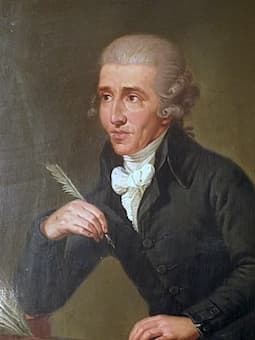
Franz Joseph Haydn by Ludwig Guttenbrunn, 1770
Although the relationship between Mozart and Haydn is not well documented, there is plenty of evidence that they enjoyed each other’s company and greatly respected each other’s work. They probably first met around 1783/84 in Vienna, and it has been suggested that they played chamber music together. Haydn did not have a shred of jealousy in his body, and he freely praised Mozart. “If only I could impress Mozart’s inimitable works on the soul of every friend of music,” he writes, “and the souls of high personages in particular, as deeply, with the same musical understanding and with the same deep feeling, as I understand and feel them, the nations would vie with each other to possess such a jewel.” Mozart in turn, had the highest admiration for Haydn. An early biographer related the following anecdote: “At a private party a new work of Haydn was being performed. A number of musician were present, and the one standing next to Mozart found fault with one thing after another. Mozart listened patiently for a while, and when the faultfinder conceitedly declared ‘I would not have done that,’ Mozart retorted: Neither would I, because neither of us could have thought of anything so appropriate.” Most famously and stylistically influenced by Haydn’s Opus 33 string quartets, Mozart wrote his six “Haydn” quartets during the early years of their friendship. Haydn’s response to Leopold Mozart upon hearing the works for the first time is legendary. “Before God and as an honest man I tell you that your son is the greatest composer known to me either in person or by name.”
Joseph Haydn: String Quartet No. 34 in B-flat Major, Op. 33, No. 4 (Borodin Quartet)
Wolfgang Amadeus Mozart: String Quartet No. 14, K. 387 “Spring”
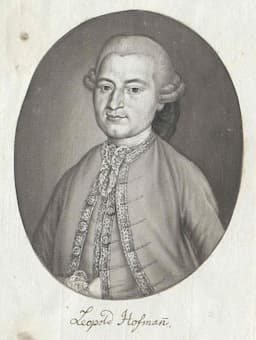
Leopold Hofmann
A talented violinist and organist, Leopold Hofmann (1738-1793) enjoyed a considerable reputation as a composer in the Vienna of his time. His contemporaries regarded him as one of the most gifted and influential composers of his generation. During the 1760s and early 1770s, Hofmann composed over sixty highly popular concertos, and after Haydn, he had more works listed in the Breitkopf Catalogue than any other composers. He was lauded as the founder of a Viennese 19th-century school of violin playing, and his sacred music was singled out for special praise. An anonymous reviewer described him “as a genius who was born for lyric poetry.” Such high praise didn’t sit well with Joseph Haydn, who went to “great length to discredit him,” and publically called him a “loudmouth.” Hofmann held his first professional post at St. Michael’s church followed by the musical directorship of nearby St. Peter’s. Eventually, he secured the highly esteemed position of Kapellmeister at St. Stephen’s Cathedral in 1772. Establishing his concerto subscription series, Mozart was in direct competition with Hofmann. They seemed to have enjoyed a cordial relationship, as Mozart was appointed Hofmann’s assistant at St. Stephens in May 1791, at Hofmann’s request. The position was unpaid, but Mozart was slated as his successor when Hofmann, who at that time suffered from poor health, retired or died. It is ironic that Hofmann outlived his assistant by about fifteen months.
For more of the best in classical music, sign up to our E-Newsletter
Leopold Hofmann: Concerto for Oboe and Harpsichord in C Major (Badley C1) (Stefan Schilli, oboe; Jenő Jandó, harpsichord; Nicolaus Esterházy Sinfonia; Béla Drahos, cond.)
Wolfgang Amadeus Mozart: Piano Concerto No. 23, K. 488

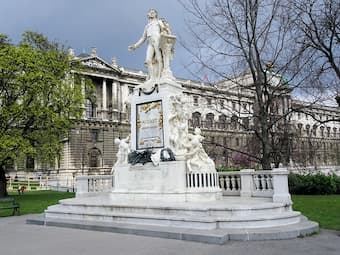

How could Mozart have used the term “robot”, if it was not coined until 1920?
Mozart used the word “Mechanikus”, which is here translated as “robot”.
Well, Mozart did not say that in English either. Read, then you will know.
https://bachtrack.com/de_DE/mozart-clementi-duell-competitions-november-2017
I guess he must have said “automaton”. These were sort of mechanical robots, usually made by clock makers, and were very fashionable in Mozart’s time, especially at European courts.